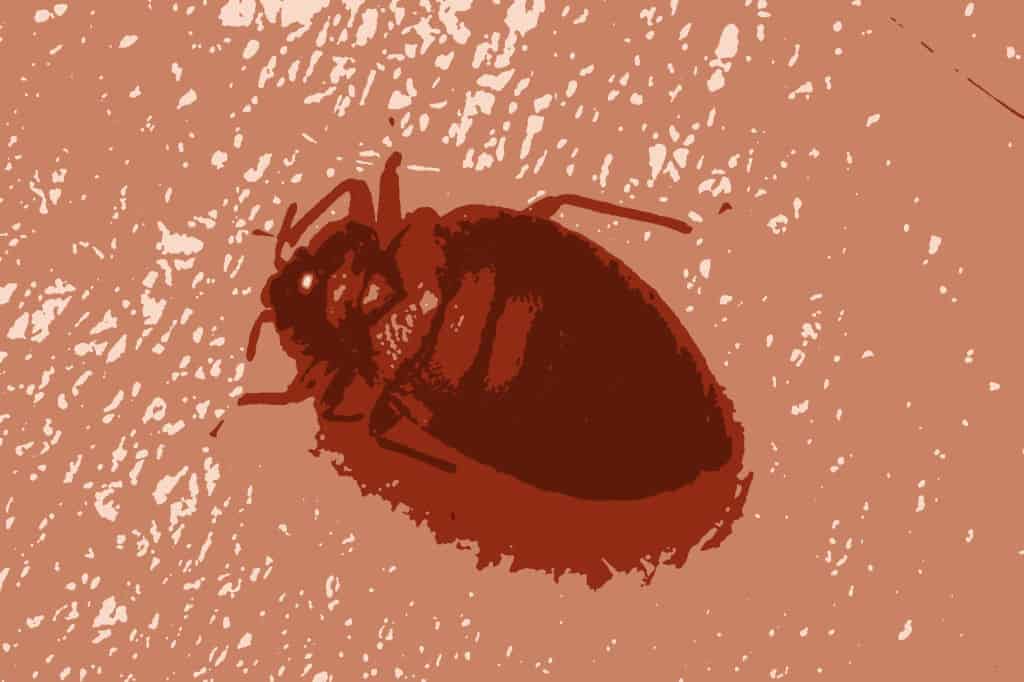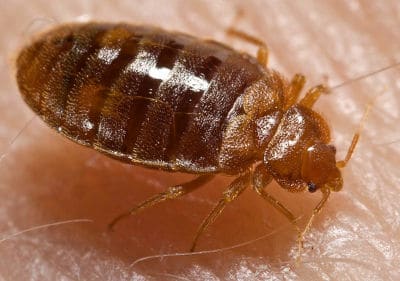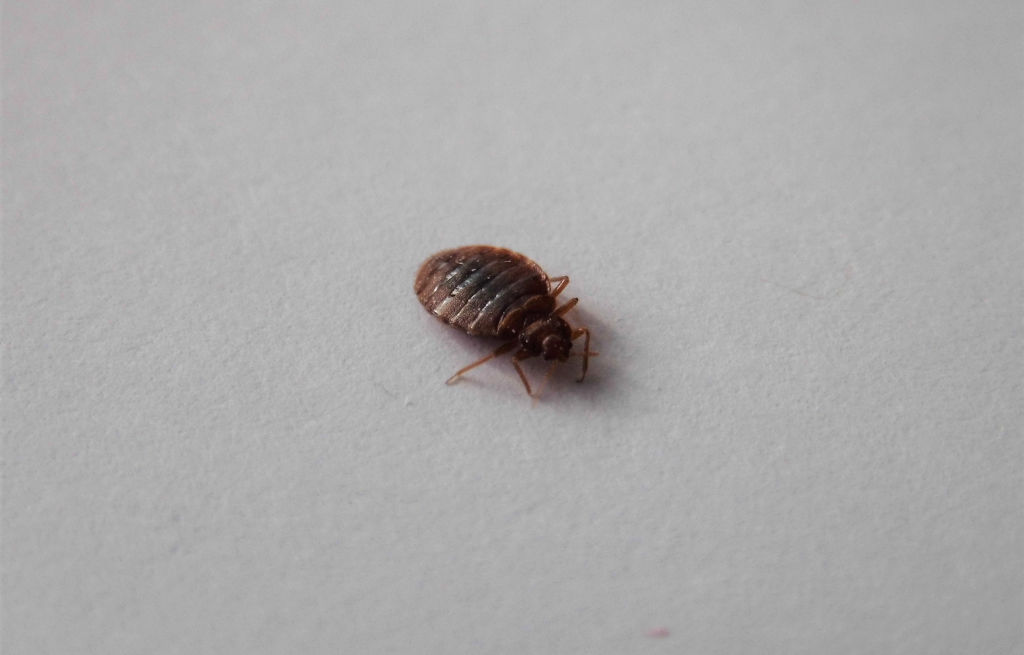According to Cornell University’s NYSIPM, bed bugs can survive for a very long time and can be extremely difficult to get rid of.
Bed bugs live 2 to 4 months, on average in the real world, such as our mattresses, luggage, and backpacks. Bed bug lifespan varies depending on temperature and the availability of food, which can prolong their lifespan or shorten it.
They feed on our blood, but luckily, we usually aren’t aware when they feed on us. Also, they can’t hurt us much, but they can leave itchy bed bug bites. Further scratching can cause infections, so it’s important not to scratch.
Bed bug problems peak during summer, because they become active during warm temperatures, from July through September.
Disclaimer: Some of the links in this article are affiliate links that may provide me with a small commission at no cost to you. I only recommend only the best products and services. Read about affiliate disclosure in my privacy policy.
At What Temperature Do Bed Bugs Die?
According to IPM at University of California and Quarles (2015), bed bugs quickly die at temperatures greater than 113°F (45°C), and lower than 1.4°F (-17°C).
Temperatures of 118°F (48°C) are quickly lethal to adult bed bugs, whereas death at 113°F (45°C) takes about 95 minutes.

In cold, it takes 4 days at 0°F (-17.8°C) to kill all the bed bugs and less than 24 hours to kill the bed bugs with dry ice. (Sources: 1, 2, 3)
Bed bug eggs take a bit longer to kill. Bed bug eggs are killed in 7h at 113°F (45°C), and in 72 minutes at 118°F (48°C). Bed bugs that are not killed by high temperatures are immobilized.
Bed Bug Temperature Chart
| Bed Bug Stage | Lethal Temperature (HEAT) | Time Duration |
|---|---|---|
| Bed bug adults and nymphs | 113°F (45°C) | 95 minutes |
| Bed bug eggs | 113°F (45°C) | 7 hours |
| Bed bug adults and nymphs | 118°F (48°C) | few minutes |
| Bed bug eggs | 118°F (48°C) | 72 minutes |
| STAGE | (COLD) | TIME |
| Bed bug all stages | 0°F (-17.8°C) | 4 days |
| DRY ICE | ||
| Bed bug all stages | −109.3°F (-78.5°C) | 24 hours |
Sources: Kells, Goblirsch at umn.edu | Changlu Wang at rutgers.edu
Death of life stages of bed bugs is a function of time and temperature.
Lower temperatures will slow down the development of bed bugs, and as the temperature rises, their activity increases. Bed bugs will cease activity at 97°F (36°C), but they remain alive. To get rid of them completely, we must raise the temperature above 113°F and keep it there for the specified time, as shown in the chart above.
The recommendation for commercial heating services is to use temperatures of at least 140°F for two hours or 130°F for three hours. This will kill most bed bugs and eggs.
The minimum lethal temperature is 113°F. It doesn’t matter at which stage the bed bug is at, it will die at temperatures above 113°F. The only difference is the time it takes.
How Long Does it Take to Get Rid of Bed Bugs?
According to New York State Integrated Pest Management at Cornell University, it will take at least 3 weeks to get rid of bed bugs.
Here are the reasons why:
- preparation takes about a week
- two weeks in a freezer kills the crawling bed bugs
- because insecticides don’t kill the eggs, which take about two weeks to hatch, the area needs to be inspected again after two weeks and apply more insecticides if needed,
- the owner must do the necessary preparation for extermination, and do the cultural and mechanical control work while the PMP (pest management professional) handles the insecticides
PMPs should be knowledgeable about bed bugs, educating you so you understand why preparation is important, and why it takes so much time.
How Long Do Bed Bugs Live After Spraying?
Bed bugs can potentially remain alive for months after incorrect spraying, by migrating and remaining in protected areas to survive or find new hosts. If you do the spraying treatment correctly, it will take at least 3 weeks to get rid of bed bugs.
Using fumigation and full-structure heat treatment can kill the bed bugs after the first treatment, but this is very costly. Note that fumigation is not the same thing as fogging.
Leaving the furniture in storage, or vacating the areas in the hopes that bed bugs will die out, is not a sound strategy, according to research. They can survive by staying dormant.
Bed bugs can be difficult to eliminate, especially on your own.

Using insecticides incorrectly can scatter bed bugs to other rooms and areas. It takes a lot of dedication to get rid of bed bugs completely on your own, which is why it’s recommended to leave it to the professionals.
How Long Do Bed Bugs Live in a Plastic Bag?
If you freeze the plastic bag with bed bugs in it, they won’t survive more than two weeks. You can use dry ice to kill bed bugs by putting it in plastic garbage bags or boxes, filled with your belongings. This way, bed bugs, and eggs will be killed in 12 to 24 hours.
General advice is, when you find a bed bug, seal it in a plastic bag, and throw it away. Then call the professionals to exterminate them.
Generally, bugs are more likely to be found on materials such as wood, paper, or fabric as compared to metal or plastic, but if you do catch one, try not to disturb the other ones.
How Long Can Bed Bugs Live Without Air?
Bed bugs cannot live without air, or oxygen at all. However, if you were thinking of suffocating them, the method may be difficult to put into practice.
Even though an experiment was done regarding this, the method is far from perfect, and not mentioned in any scholarly sources that I’ve used to write this article. In their experiment, they placed hundreds of bedbugs in air-tight vials at room temperature, and no bed bug survived after 5 days. They concluded that this method can be used to eliminate bedbugs, if done correctly, with large enough air-tight bags.
As far as I was able to research, this method is not commonly used by PMPs (pest management professionals), probably because it is not as effective as using insecticides and heat.
How Long Can Bed Bugs Live in an Empty House?
Bed bugs can survive for several months in an empty house, by migrating to protected areas, feeding on mice or pets, or simply going dormant. Taking a vacation from your house is unlikely to starve them.
Unless the temperature is taken into account of this empty house, bed bugs can still survive, and additional treatments will be necessary.
To completely eliminate bed bugs, the temperature in the house needs to be above 120°F for a full hour and maintained at every point in the building: the outer walls, deep in the sofa, etc.

How Long Can Bed Bugs Live Without Food?
Bed bugs can live over a year without feeding. They can go without food for 20 to 400 days, depending on many factors, such as temperature, the development stage of the bed bug.
The reason why they can survive for so long without food is that bed bugs can go into a sort of hibernation state called diapause, enabling them to go dormant, which slows their metabolism and saves energy.
Even though bed bugs can survive up to a year without a host, studies have shown that they can’t live for more than a few days on temperatures below 0°F. They may be very resilient to cold temperatures, but they still can’t last in extreme conditions for long.
Bed bugs survive by feeding on blood, that’s their only food source. Common bed bug prefers human blood, but it will also feed on the blood of other animals, dogs, cats, rodents, etc.
An interesting thing is that bed bugs aren’t eating as often as you’d think, only every 5 to 10 days for about 3 to 10 minutes. When they bite, you probably won’t feel a thing. Bed bug bites are very similar to mosquito bites, and they are often confused with them as well.
How Long Can Bed Bugs Live Outside?
First, bed bugs live indoors, not outside. But if you take them outside, especially if it’s freezing cold they won’t survive for more than two weeks. If you were thinking of killing bedbugs by turning off the heat in your home during winter, or putting your furniture outside and leaving it there, then you will probably be unsuccessful.
Bed bugs are much more resistant to cold than heat. They are pre-adapted by evolution to resist cold temperatures.
To kill bed bugs with cold temperatures, “flash freezing” is needed. This means freezing with dry ice at 0°F and leaving it there for at least 12 to 24 hours. Either that or with extreme heat above 113 degrees.
How Long Do Bed Bugs Live on Clothes?
Bed bugs can live on clothes for as long as they have a source of food, which can be months or years. If you wear such clothes, they will live for as long as you don’t wash that clothes. Washing your clothes at 140°F (60°C) will kill all life stages of bed bugs.
Tumble drying in a hot dryer at temperatures greater than 104°F (40°C) for 30 minutes or freezing at 1.4°F (-17°C) for several hours will also kill the bed bugs. Soaking your clothes will kill adults and the nymph stage of bed bugs, but will not kill the eggs.
Can Bed Bugs Live in Your Hair?
Bed bugs live in crevices or hidden cracks in chairs or furniture, maybe even clothes, but not on your hair. They live in secluded areas, hiding most of the time.
Bed bugs don’t live in your hair because:
- It’s too dangerous – they can’t hold onto hair, or navigate
- they feed very rarely, every 5 to 10 days, and the rest of the time they hide in places where they are safe, not on moving places such as your head, which you wash all the time, touch, move, etc.
- They also don’t live in warm places, which your hair sometimes is
They could live in your clothes, rather than your hair, but more likely they are on furniture, briefcases, chairs, backpacks, shoes, etc.
How Long Can Bed Bug Eggs Live?
Bed bugs usually hatch in about two weeks. Putting them in a hot dryer for 60 minutes would kill them, as well as freezing them below 32°F (0°C) for 30 days, will too. It takes 7h to kill bed bug eggs at 113°F (45°C), or 72 minutes at 118°F (48°C).
Bed bugs go through five different stages after they hatch. The entire cycle from egg to adult lasts anywhere from 5 weeks to 4 months, depending mostly on temperature and the availability of food. The time for the egg to become an adult bed bug will depend on several factors such as temperature, availability of blood, and resistance.
Female bed bug produces about one egg per day, which takes about 10-14 days to hatch and another 5 to 6 weeks for the nymph to develop into an adult bed bug. A female bed bug will stop laying eggs after 11 days without eating.
Where Do Bed Bugs Live in the Wild?
This is a common misconception about bed bugs – they don’t live outside, in the forests or grass. They are exclusively indoor living creatures.
Bed bugs are found anywhere where there is a high turnover of people such as hotels, resorts, apartments, buses, churches, homes, hospitals, schools theaters, nursing homes, etc.
Anywhere where there are humans or other animals – bedbugs can potentially be found there. Additionally, birds and bats can sometimes bring their bed bugs with them, which are called bird bugs and bat bugs, respectively.
Bed bugs don’t base their location on people’s hygiene or sanitation. If there is blood – they’re happy.
Where do bed bugs come from?
Bed bugs come as stowaways in furniture, luggage, clothing, and boxes while being moved from another location. This is why you can’t get rid of bedbugs by moving – they’ll just come with you.
They have flat bodies, which allow them to hide better in areas where they’ll be hard to spot. If you are moving something into your home, do a thorough inspection of the furniture or boxes, because they can survive for many months without food.
Take care and don’t let the bed bugs bite!





